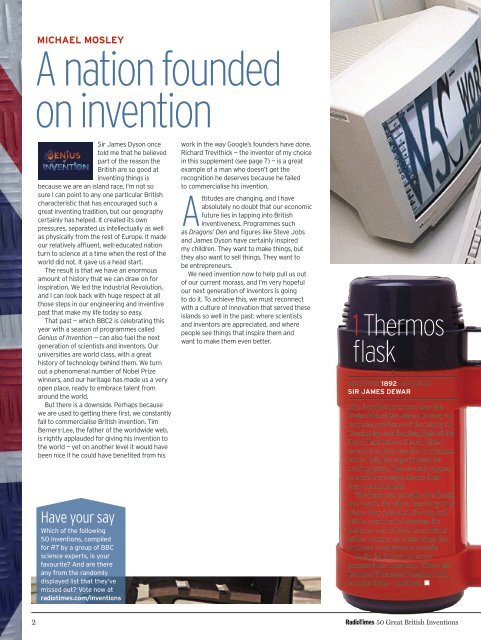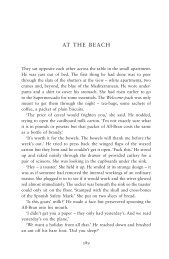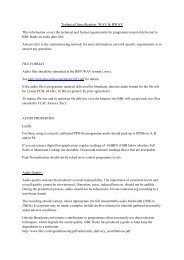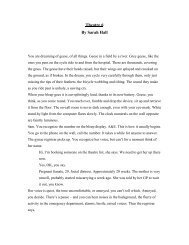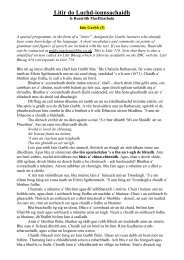50 Great British Inventions - BBC
50 Great British Inventions - BBC
50 Great British Inventions - BBC
Create successful ePaper yourself
Turn your PDF publications into a flip-book with our unique Google optimized e-Paper software.
MICHAEL MOSLEY<br />
A nation founded<br />
on invention<br />
Sir James Dyson once<br />
told me that he believed<br />
part of the reason the<br />
<strong>British</strong> are so good at<br />
inventing things is<br />
because we are an island race. I’m not so<br />
sure I can point to any one particular <strong>British</strong><br />
characteristic that has encouraged such a<br />
great inventing tradition, but our geography<br />
certainly has helped. It created its own<br />
pressures, separated us intellectually as well<br />
as physically from the rest of Europe. It made<br />
our relatively affluent, well-educated nation<br />
turn to science at a time when the rest of the<br />
world did not. It gave us a head start.<br />
The result is that we have an enormous<br />
amount of history that we can draw on for<br />
inspiration. We led the Industrial Revolution,<br />
and I can look back with huge respect at all<br />
those steps in our engineering and inventive<br />
past that make my life today so easy.<br />
That past — which <strong>BBC</strong>2 is celebrating this<br />
year with a season of programmes called<br />
Genius of Invention — can also fuel the next<br />
generation of scientists and inventors. Our<br />
universities are world class, with a great<br />
history of technology behind them. We turn<br />
out a phenomenal number of Nobel Prize<br />
winners, and our heritage has made us a very<br />
open place, ready to embrace talent from<br />
around the world.<br />
But there is a downside. Perhaps because<br />
we are used to getting there first, we constantly<br />
fail to commercialise <strong>British</strong> invention. Tim<br />
Berners-Lee, the father of the worldwide web,<br />
is rightly applauded for giving his invention to<br />
the world — yet on another level it would have<br />
been nice if he could have benefited from his<br />
Have your say<br />
which of the following<br />
<strong>50</strong> inventions, compiled<br />
for RT by a group of <strong>BBC</strong><br />
science experts, is your<br />
favourite? and are there<br />
any from the randomly<br />
displayed list that they’ve<br />
missed out? vote now at<br />
radiotimes.com/inventions<br />
work in the way Google’s founders have done.<br />
Richard Trevithick — the inventor of my choice<br />
in this supplement (see page 7) — is a great<br />
example of a man who doesn’t get the<br />
recognition he deserves because he failed<br />
to commercialise his invention.<br />
Attitudes are changing, and I have<br />
absolutely no doubt that our economic<br />
future lies in tapping into <strong>British</strong><br />
inventiveness. Programmes such<br />
as Dragons’ Den and figures like Steve Jobs<br />
and James Dyson have certainly inspired<br />
my children. They want to make things, but<br />
they also want to sell things. They want to<br />
be entrepreneurs.<br />
We need invention now to help pull us out<br />
of our current morass, and I’m very hopeful<br />
our next generation of inventors is going<br />
to do it. To achieve this, we must reconnect<br />
with a culture of innovation that served these<br />
islands so well in the past: where scientists<br />
and inventors are appreciated, and where<br />
people see things that inspire them and<br />
want to make them even better.<br />
Michael Mosley presents<br />
a new series, The Genius<br />
of Invention, which starts<br />
on <strong>BBC</strong>2 next week<br />
1 Thermos<br />
flask<br />
INvENTED 1892 INvENTOR<br />
SIr JAMES dEwAr<br />
This humble invention was the<br />
brainchild of Sir James Dewar, an<br />
eminent professor of chemistry at<br />
Cambridge and leading light of the<br />
Royal Institution. Dewar didn’t<br />
invent it to keep tea hot on picnics,<br />
but to help his experiments on<br />
cooling gases, like air and oxygen,<br />
to such low temperatures that<br />
they would liquefy.<br />
The flask was actually two flasks,<br />
one inside the other, touching only<br />
where they joined at the top, and<br />
with a vacuum in between. Its<br />
purpose was to keep its contents<br />
either warmer or cooler than the<br />
ambient temperature outside.<br />
Sadly for Dewar he never<br />
patented his invention. When the<br />
German Thermos Company did,<br />
he sued them – and lost. <br />
2 Worldwide web<br />
INvENTED 1989 INvENTOR TIM BErnErS-LEE<br />
DID YOU KNOW?<br />
Berners-lee’s<br />
parents were<br />
Both involved<br />
in the<br />
developMent<br />
of one of the<br />
earliest<br />
CoMputers, the<br />
ferranti Mark 1,<br />
unveiled in 1951.<br />
Not to be confused with the internet, which is a system of<br />
linked computer networks, the worldwide web was invented<br />
by <strong>British</strong> computer scientist Tim Berners-Lee. It was while<br />
working at Cern, the European particle physics lab, that he<br />
wrote a proposal showing how “hypertext” – a way of sharing<br />
information via links – could be married with the internet to<br />
create a system for fellow scientists to share data.<br />
He created the first server in late 1990 and, on 6 August,<br />
1991, the web went live, with the first page explaining how<br />
to search and how to set up a site. One critical innovation<br />
was that web users could link their page to another without<br />
the need for the other user’s approval. And Berners-Lee<br />
gave his invention to the world for free. <br />
3 Lawnmower<br />
INvENTED 1827<br />
INvENTOR EdwIn BEArd BuddIng<br />
What could be more quintessentially <strong>British</strong> than<br />
a perfectly mown lawn in summer? Until inventor<br />
Edwin Beard Budding came up with the lawnmower<br />
in 1827, this was the preserve only of the very rich,<br />
who could afford an army of people to cut their<br />
lawns with scythes. Budding already had a<br />
reputation for inventiveness: he devised a repeating<br />
pistol that predated Samuel Colt’s, a cotton carding<br />
machine of a design that is still used today, and<br />
the first screw-adjusted spanner.<br />
His first mower was 19in wide, had a box that<br />
collected the clippings as they were thrown<br />
forward by the blades and allowed the user<br />
to adjust the height of the cut. It was, at<br />
first, still a fairly exclusive item: Oxford<br />
colleges and the Royal Zoological Society<br />
were among his first customers. But its<br />
popularity spread as more <strong>British</strong> homes<br />
came to have gardens. And because<br />
it made lawns more affordable,<br />
it gave an important boost<br />
to sports that were<br />
played on grass, such<br />
as cricket, rugby<br />
and football. <br />
4 Float glass<br />
InvEnTEd 1959 InvEnTOr AlAstAir Pilkington<br />
When we think of inventions, it’s machines and gadgets that<br />
usually come to mind. But what about all the processes needed<br />
to create and manufacture the materials the modern world is<br />
made of? Take glass: almost all the glass we use today is made<br />
using the “float” process, devised by Alastair Pilkington in 1959.<br />
Molten glass is poured from a furnace onto a shallow bath of<br />
molten tin: the glass floats on the tin, and under its own weight<br />
it spreads out to form a level surface. As it gradually cools on<br />
the tin, the glass is drawn off in a continuous ribbon. This<br />
process made it far easier and cheaper to make high-quality<br />
glass, without the need for grinding and polishing. <br />
2 RadioTimes <strong>50</strong> <strong>Great</strong> <strong>British</strong> <strong>Inventions</strong><br />
RadioTimes <strong>50</strong> <strong>Great</strong> <strong>British</strong> <strong>Inventions</strong><br />
3


